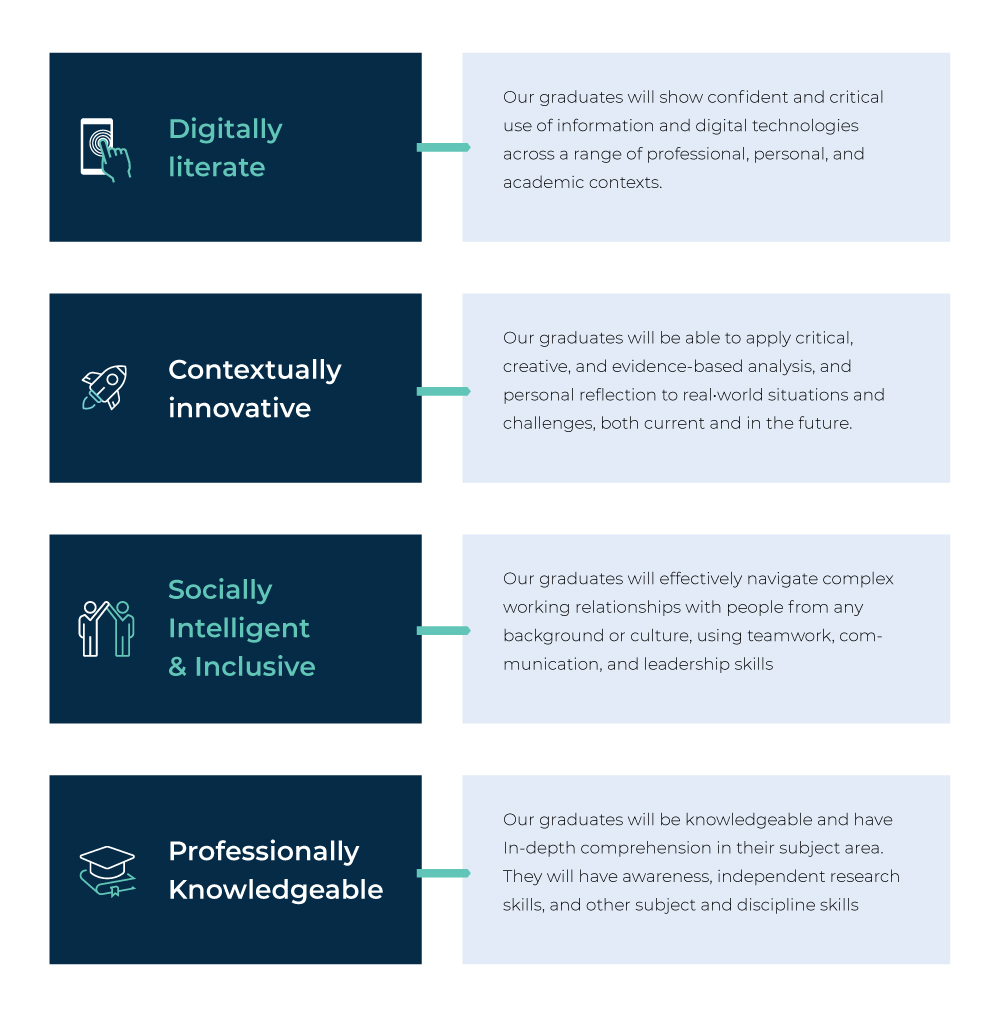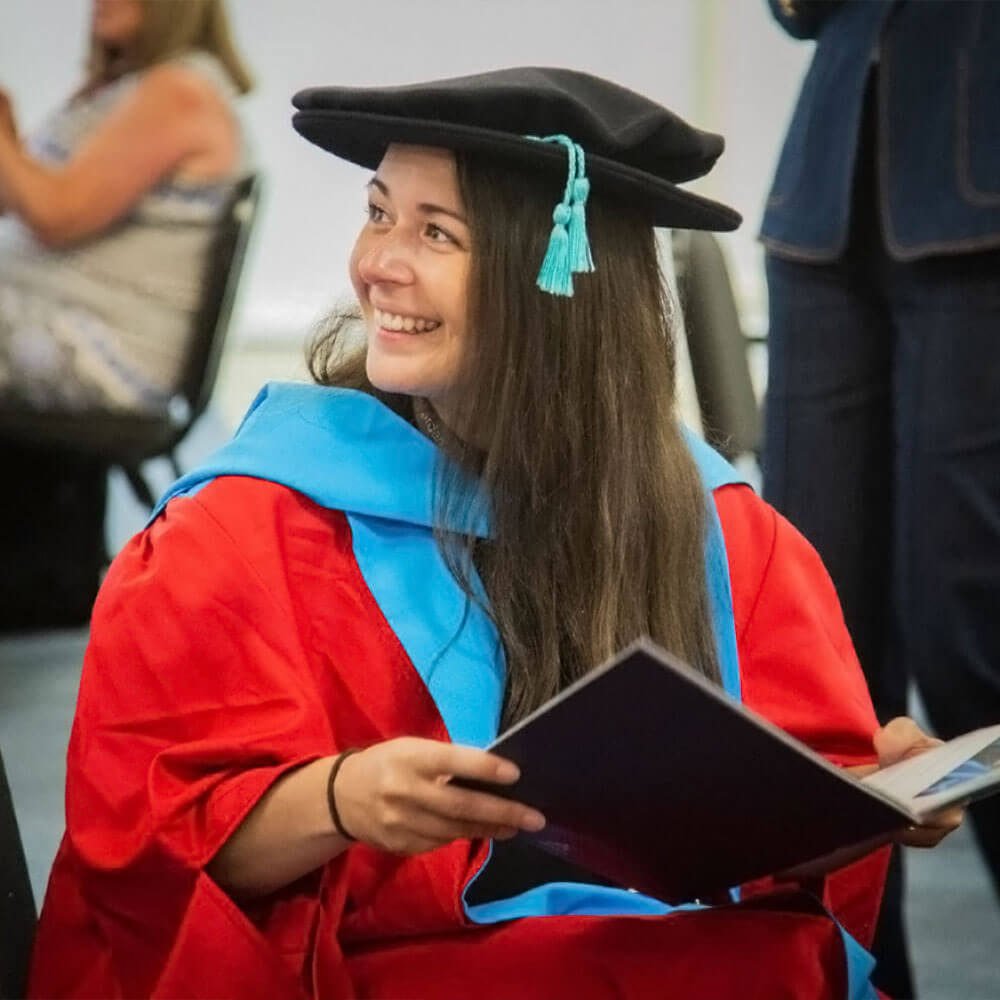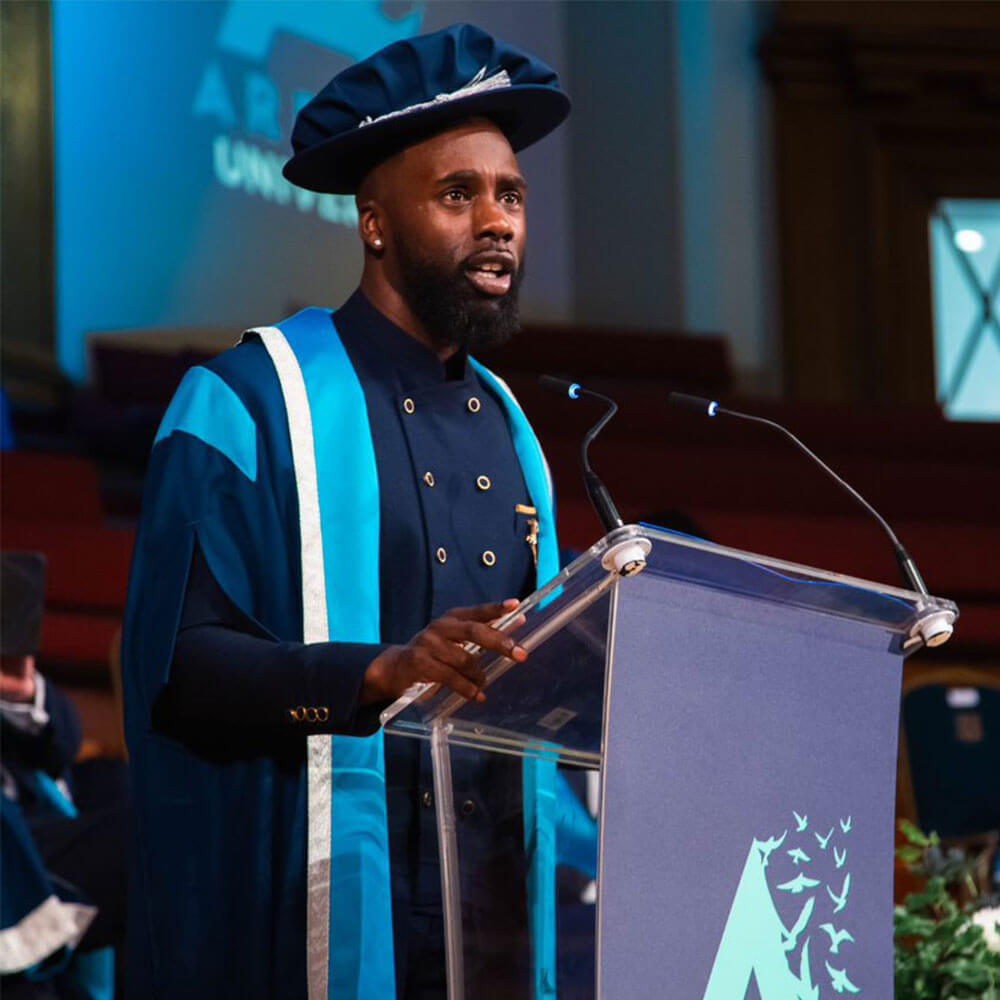What are graduate attributes?
Graduate attributes are statements that a university believes detail the high-level skills, qualities, characteristics, and mindset that their graduates should develop through engaging in their course, learning, and wider experiences as a student.
At a wider level, graduate attributes are qualities that shape the contribution individuals can make to their profession, to society, and as agents of social good for the future.
What are graduate attributes at Arden University?
Though each graduate is unique, our distinctive Arden graduate attributes highlight what it means to be an Arden graduate and the characteristics that set you apart. The courses and opportunities offered to you, our students, support the development of these skills and mindsets.
Together, these attributes prepare and equip our graduates to find their place and careers in a fast-moving, diverse, and digital world, so that you can face your future with confidence.
Why are these attributes important?
We want you to thrive and succeed as an Arden graduate. In the world of work, there is a growing demand for a highly skilled workforce that is adaptable, agile, and resilient. In recent years we have seen society and workplaces transformed by the digital revolution, globalisation, and the Covid-19 pandemic.
This means that, regardless of discipline, employers are increasingly looking for ‘work ready’ reflective graduates with a wide skillset, and professional expertise. Such graduates need to be confident in negotiating, managing, and progressing in a rapidly developing world of work.
Arden will support you to have the skills and growth mindset that can help you face current and future challenges and make a positive contribution to your communities and career journey.
How do you develop these attributes across your academic journey?
Arden’s graduate attributes are embedded within all our courses, modules, and learning outcomes. You will have the opportunity to develop these skills and qualities through engaging with your learning at each level of your degree, and other opportunities and experiences available to you. It is, however, up to you to use appropriate reflection and evaluate your own development needs, as well at showing initiative in seeking out extracurricular experiences to help you grow.
We also have a dedicated careers team, academic skills team, and success coaches to support you further. Whether you are a career starter, changer, or developer, our team can help you reflect on your skills and attributes to discover career options, focus your career ideas, and ultimately achieve your career goals. They can also help you identify opportunities and extracurricular activities to develop your skills.
Arden's graduate attributes
More detailed information about our graduate attributes can be seen below, including a breakdown of each attribute into activities that should be achieved at each level of study.
Suggestions for how you may develop these attributes are noted, although please bear in mind that these are examples and not an exhaustive list.
Digitally literate
- Digitally literate to show confident and critical use of information and digital technologies across a range of professional, personal, and academic contexts. This may include but is not limited to computer literacy, digital information, digital media, digital communication, and collaboration competencies.
- Engaging with our virtual learning environmen
- Approach to studies, assessment, and dissertation
- Use of subject-specific and general digital tools (e.g., Excel, statistical models)
- Use of appropriate software across contexts
- Remote work experience and extra-curricular activities, workshops, networks
- Identify digital tools and/or services and self-assess digital capabilities. Use digital applications and understand strategies for a restricted range of given purposes and tasks, with guidance.
- Identify and apply digital tools and/or services and self-assess digital capabilities. Identify and use appropriate digital applications for given purposes and tasks.
- Identify, evaluate, and apply digital tools and/or services while reflecting on digital capabilities and opportunities for self-development. Select and use specific digital applications and strategies, as appropriate for various purposes and tasks.
- Evaluate and apply digital tools and/or services while critically reflecting on opportunities for developing digital capabilities. Select, use, modify, and evaluate digital applications and the latest innovations and strategies which are appropriate for various purposes and tasks.
- Evaluate and apply digital tools and/or services while critically reflecting on opportunities for developing novel digital capabilities. Identify, select, plan for, use, modify, and evaluate digital applications and strategies to enhance the achievement of aims and desired outcomes.
Contextually innovative
- Contextually innovative through applying skills of critical, creative, and evidenced-based analysis and/or personal reflection to current real-world situations and future challenges.
- Approach to studies, assessment, dissertation, and academic and career planning
- Problem-based learning
- Discussions and reflections within and outside modules
- Personal and professional reflection
- Discussion forums
- Work experience and extra-curricular activities
- Societies and special interest groups
- Solve given and clearly defined problems, carry out predefined and possibly innovative approaches, and check and understand how the solution has solved the problem, reflecting on the solution achieved.
- Solve given and clearly defined problems, use specified and innovative approaches, and analyse, evaluate, and reflect on the approaches and solutions.
- Solve common problems, and identify, explain, and use innovative approaches with reference to theory and practice. Identify innovative practices and evaluate the approaches and solutions with some critical context and reflection.
- Identify problems, including complex ones, analyse, and solve them with reference to theory and practice. Select, justify, and use innovative approaches, including some at the forefront of the subject/profession. Critically evaluate and reflect on the approaches and solutions identified and if possible embedding possibilities for originality or creativity.
- Identify and solve novel and complex problems related to aims and desired outcomes. Critically evaluate and reflect on the approaches and solutions identifying and embedding possibilities for originality or creativity.
Socially intelligent
- Socially intelligent and proactively inclusive, able to effectively navigate complex (working) relationships with others from any background or culture using teamwork, communication, and leadership skills.
- Approach to studies, assessment, and dissertation
- Discussion forums and virtual learning environment
- Peer activities
- Societies, work experience, extra-curricular activities, special interest groups
- Personal reflection
- Team engagement is evidenced while experiencing different views of others, including an understanding of equality, diversity, and inclusion. Accurately present ideas, information, or results. Operate with others in clearly defined situations, to meet given objectives and own responsibilities, using given approaches/ techniques.
- Distinguishable team engagement is evidenced while recognising the different views of others, including an understanding of equality, diversity, and inclusion. Operate with others in given situations, to meet specified objectives and own responsibilities, using given approaches/techniques.
- Clear team engagement is evidenced while recognising the different views of others, including an appreciation of equality, diversity, and inclusion. Operate with others in various situations, to meet specified objectives and own responsibilities, using appropriate approaches/ techniques.
- Clear and effective team engagement is evidenced while enabling understanding and engagement of others, clearly integrating possible diversity, equality, and inclusion to achieve outputs. Identify objectives and own responsibility in operating with others, and use and evaluate strategies to meet them.
- Clear and effective team engagement is evidenced while enhancing the understanding and engagement of others, clearly using possible diversity, equality, and inclusion as an advantage. Identify who and how others may help in achieving aims and desired outcomes and put plans into action.
Professionally knowledgeable
- Professionally knowledgeable in their subject area, with in-depth comprehension, awareness, independent research skills, and other skills associated with their subject area and discipline(s).
- Teaching and learning activities
- Self-directed learning, reading, practice, and event attendance
- Engagement with workshops
- Engaging with library and academic skills resources
- Special interest groups and networking
- Engaging in extra-curricular activities
- Gather knowledge and understanding of the subject area with the ability to define the core skills and concepts associated with the discipline(s).
- Analyse information of the subject area with the ability to identify key questions, research, and pursue evidence-based arguments within the discipline using academic and professional body resources.
- Evaluate understanding of the subject area with the ability to identify key questions, research, and pursue evidence-based arguments within the discipline using various academic and professional body resources.
- Evaluate and further contextualise understanding of the subject area with the ability to understand how key knowledge is constructed. Research and pursue evidence-based arguments within the discipline using a broad range of academic and professional body resources. Show some ability to engage with different traditions of thought, and the ability to apply their knowledge in practice including in multi-disciplinary or multi-professional contexts.
- Critically evaluate and further contextualise understanding of the subject area with the ability to link the discipline(s) to local, national, and global issues, and research and pursue evidence-based arguments within the discipline using an extensive range of academic and professional body resources. Show clear ability to engage with different traditions of thought, and the ability to apply their knowledge in practice including in multi-disciplinary or multi-professional contexts.




